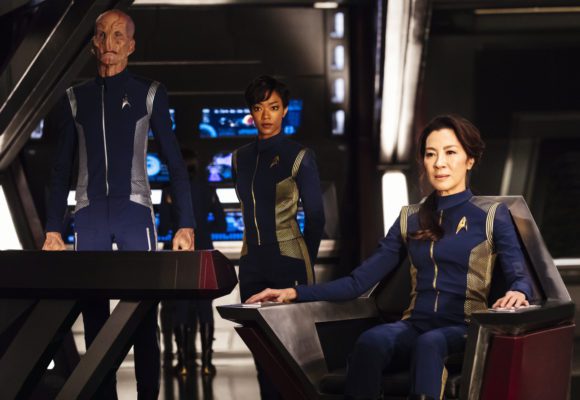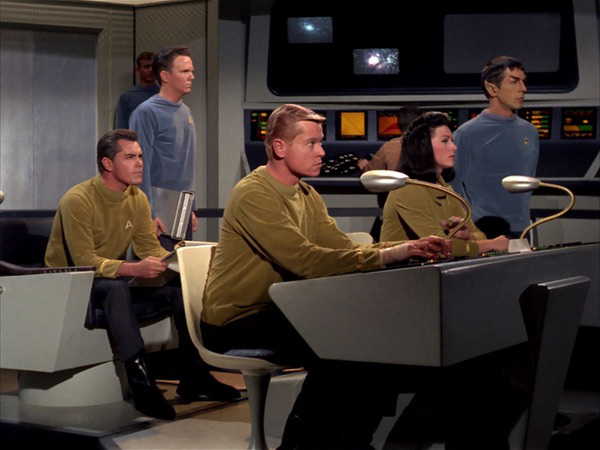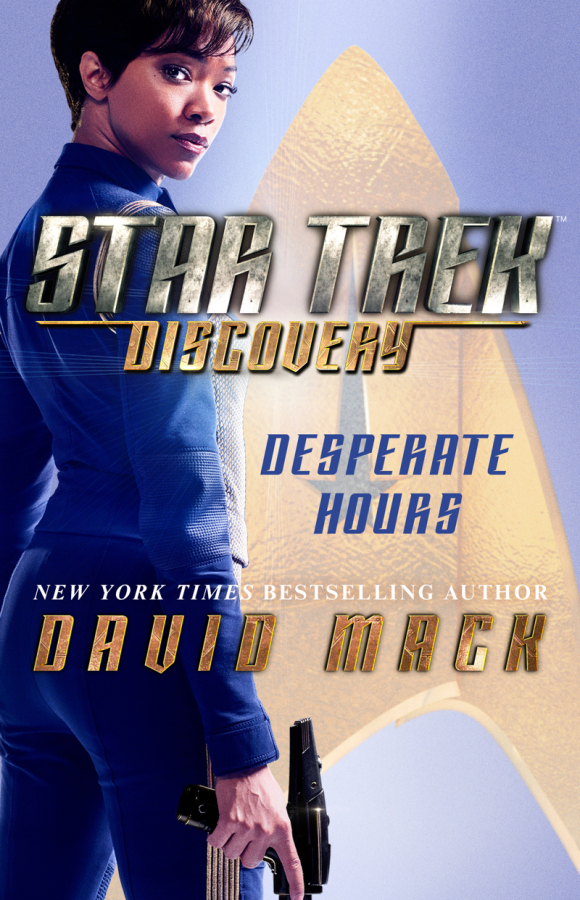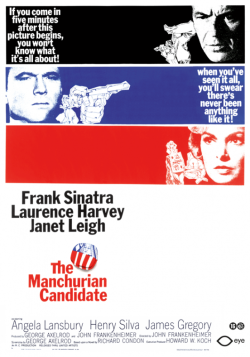Spoilers ahead. If that matters, you’ve been warned.
After yesterday’s blog about my first reactions to the new Star Trek: Discovery, I decided I should check out this prequel novel that dropped from one of the franchise’s regularly accoladed novelists, David Mack. The historian’s note confirms something that I should have known up front and needed to double check: the events of the Shenzhou‘s “Battle at the Binary Stars” against the Klingon Empire (as depicted in series episode two by that same title) takes place at the same time as the Enterprise‘s mission to Talos IV (original pilot “The Cage” / reworked as “The Menagerie” parts 1 and 2). The events of this novel take place one year before those reference points. Our series lead Michael Burnham is promoted from Tactical Officer to Acting First Officer of the Shenzhou under the command of Captain Philippa Georgiou, and Lt. Saru is promoted behind her to Second Officer. Apparently he has served in Starfleet longer and has a sterling record compared to Burnham’s record of reprimand and bravery (often the difference between a good officer and a truly great officer in both fact and fiction), so he’s understandably steamed over this. I’m sure this will be a character trait that continues into the series given her sentencing at the end of the second episode before her transfer to Discovery. In this case, the promotion is conditional, and Burnham must prove herself worthy to keep the post. Since we already know she will, this is the journey of how she’ll do it.
The Shenzhou is called to protect a colony that has taken great lengths to keep Federation oversight at distance. The colony has been attacked by a large, undersea alien vessel –unleash the Kraken!!! (Kudos to the author’s sense of historical humor as he names two of a drilling rig’s crew Bowan (similar to Bowman) and Chandra from Arthur C. Clarke’s 2001: A Space Odyssey — I love inside geek nods.) When Starfleet declares the colony to be expendable, the Shenzhou must save thousands of lives, which means Burnham will have to infiltrate the alien vessel, confront her past, and make contact with the one man she has avoided for most of her life. Queue the dramatic music. Dun, dun, DUN!
Go back to the historian’s note. Why would it be necessary, do you think, to call out the reference to the Enterprise‘s mission to Talos IV? Could it be because… Captain Pike and his crew would feature prominently in this story? Could it be the “one man” Burnham has wanted to avoid all her life would be her mentor’s son, Spock? And now you know why I picked up this novel. In addition to just wanting to spend more time with the Shenzhou and her captain (seeing as how neither made out of the first two episodes), we’ve got one of the best authors in the biz being trusted to bring these two very different looks and feels of Star Trek — from opposite ends of the television timeline — together for the very first time in an attempt to reconcile the two visions into one larger whole.
So for those of you more visually inclined, we get to reconcile this…

… with this.

Ok, David Mack… you have my attention and my undying gratitude. This, my friends, is why I love the novels. Not only does Star Trek tend to work better for me in literature (especially in the last decade), the novelists are not afraid to force the square peg into the round hole and make it work. And besides, in the later words of Mr. Sulu, “I’m delighted. Any chance to go aboard the Enterprise.” What’s particularly cool is that Pike recognizes Georgiou’s superior experience as a starship commander up front, so it’s not like Enterprise gets to come in on the rep that Kirk would later build. At the same time, Starfleet sends Enterprise in specifically for a mission to which both Pike and Captain Georgiou object, the dreaded “just following orders that will lead to a large number of dead innocents.” You see, Starfleet has determined that the threat vessel is warp capable, which means there are far more than the lives of a handful of colonists on a single world at stake. It’s a game of cold numbers vs. the higher ideals of the Federation.
These are different times, different characters, different levels of experience, different mission objectives, and so perfectly Star Trek; the geek factor is high. Add to that, we already know Shenzhou is an older, smaller ship based on series dialogue, and Enterprise is relatively newer and top of the line at this time, so between the tech, the uniforms, and the very familiar faces, we’ve got ourselves a full-on cognitive disconnect. Seriously, I live for stuff like this.
There are essentially four sets of conflicts going on.
First, you have Pike vs. Georgiou in a classic standoff of “just following orders in the name of the greater good” vs. “this is what the Federation stands for, and it’s the right thing to do.” Pike, being the freshly-minted captain at this point is put in the unenviable position of antagonist, but this is how life lessons are learned, and we know his crew is rock solid. He has to learn that lesson between soldier and peacekeeper, one that, unfortunately, is one that Starfleet as a whole will have to learn all over again in the wake of the war with the Klingons.
Second there’s Commander Una (Pike’s “Number One”) vs. Lt. Saru, which builds on her character development based from previous novels to help him deal with some of his fundamental character flaws as a prey species.
Third, and most importantly, is Spock vs. Burnham, who barely know one another and learn amidst their antagonist collaborate effort that each needs what the other received. It is some much-needed and magnificently rich character development that begins with Spock busting Burnham’s chops at virtually every turn in a way that only Spock can do, and it requires Burnham to call upon all of her Vulcan-learned disciplines to keep an even keel. It doesn’t fit the characterization of Spock that we know from that original 1964 pilot episode, but it does fit perfectly with the character that we’ve come to know and love over the decades, especially as depicted in the original series proper. Spock gives us the greater insight on Burnham and reminds us that Pike is still the captain of the Enterprise… and all that implies. It’s a learning experience all around.
The final confrontation is a hostage situation involving the desperate colonists who feel like it’s Starfleet’s job to rescue them and get the alien vessel off their planet without destroying them in the process.
Along the way, every little thing that can possibly be referenced, compared, contrasted, or even appropriately back-quoted is done at the level of the uber-fan for the purposes of reconciling the greatest conflict of all: classic Trek vs. current Trek. In the end, that’s what is truly at stake. This novel is a bridge, a peace offering to those fans (like myself) who are ever-wary of the newest incarnations, reverential of the previous ones, and looking for reasons to embrace the future without feeling they’ve betrayed the past. Seriously, about the only thing not addressed is the Starfleet delta insignia. Everything else is on the table with a ready-made explanation other than, “It’s 2017 and things have to be updated because it would be ridiculous to use the designs of the 1960s.” That’s the slap in the face explanation that’s being used by the apologists who apparently didn’t get a good eyeful of the design work on Rogue One: A Star Wars Story. It’s not the designs — those are decades old and more than accepted for what they are. It’s how those designs are used and married up to the newer concepts that makes or breaks the illusion. In that spirit, it’s up to you if you want to buy into the in-story explanations offered here. Personally, I do. It’s not perfect, but any worldbuilding towards a more cohesive understanding is always appreciated. I needed this and stand ready to fully embrace such things. Something so small makes a world of difference.
This novel represents, to my knowledge, the first time Star Trek has developed a tie-in medium side by side with a brand new series. It’s more than just a novelization of a televised episode or a novel that fills in the gaps where things may be overwritten by later episodes. It feels like a true extension of the series as opposed to a traditional Trek novel. By that, I mean that the understanding is always the same: the novels are not canonical, and it’s a sucker’s game to presume otherwise, but really… this is about as close as it’s ever likely to get. Don’t get me wrong; there are a great many novels that do a far better job of telling Star Trek than much of any of the series ever did. But this time, you can tell there’s a co-development going on akin to maybe what goes on with the Lucasfilm Story Group over on Star Wars, not just “this is the story, these are the parameters, run with it.” That something like this happens literally at ground zero for the new series’ launch gives this new potential. If I were a betting man, I’d say that not only will the insights we gain into Burnham and Saru remain characteristically valid going forward, I’d wager that future writers will use this book as a referenced starting part on which to build, both for television and for prose.
What this book has done for me specifically as a fan is bring the universes together in much the same way as crossover episodes have done on TV, and with much the same reverence for the material on both sides. While watching Discovery put me at greater ease with it than I might have hoped, this novel went a long way towards helping me to find outright acceptance. It’s weird that a written version of Spock can help to make things right where even Leonard Nimoy’s final appearances in his role could not save the films for me. Sometimes it works out. Thank you for this one, David Mack. This is exactly the fan parachute I needed. It points out that even where the styles seem on the surface so completely different, there is an underlying essence of Star Trek that that achieves balance. Infinite Diversity in Infinite Combination. Interesting how something like that can be achieved when it’s actually worked towards instead of casting it three sheets to the wind as the last set of films did. This is the promise the novel offers, to reconcile past and present in the name of the future of Star Trek. Now it’s on the series itself to build on this promise.
Above and beyond any of that, this is just a really solid science fiction exploration adventure, the sort of thing I rarely seem to find anywhere outside of Star Trek in any format anymore.
On a more overarching note, even though I’ve always known on some level that Enterprise was out there on the front lines during the Federation-Klingon war that came before the original series, this story served to drive the point home in its joint mission with the Shenzhou. This shows us what Starfleet was before the war, reminds us what’s at stake as the series progresses, and offers that gentle reminder that when we next see the Enterprise under the command of Jim Kirk, the optimism of that historic five-year mission comes at a high cost and the determined and collective choice to believe, as Captain Georgiou did, in the higher ideals of humanity. It’s the same choice we have to make in the here and now if we’re going to make it that far. Is there any idea that says “Star Trek” more than that? I don’t think so.
Having said all of that, there is one sequence in this book that, due to the characters and character knowledge involved, busts this otherwise extraordinary novel down from my otherwise highest praise, from excellent to just merely good. There is a pivotal scene where Burnham and Spock need to mind meld in order to complete their objective. Burnham has had a previous mind meld with Sarek, an experience which saved her life and left him imprinted upon her in a way that Spock would not fail to notice. Such is the nature of a mind meld, after all, Spock actually interacts with Sarek as a result of this meld, which counters two points of known character building between Spock and his father.
Here’s the first: in the episode “Journey to Babel” where we’re introduced to Sarek and Amanda, it’s revealed that Spock has not spoken to his father in 18 years as a result of his decision to join Starfleet. Well, in this novel it’s only 11 years earlier, so we’ve got some time to kill, canonically speaking. That really puts a damper on the interaction between the two in the mind meld.
Here’s the second:
This pivotal character sequence reveals that Spock never mind melded with his father. While this is still technically true, he has now, in fact, touched Sarek’s mind through Burnham the same way Picard offers him to do so in the above scene, which means that either the book is wrong or Spock is lying to Picard. That touching of minds is what enabled them to speak, after all.
So much near perfect in this novel, and one giant photon torpedo into the understanding of Star Trek‘s most beloved character. That’s the only serious flaw with this novel, but it’s a big damn flaw. What, do people think this is Game of Thrones? We’re not talking Khan recognizing Chekov in Star Trek II. This is far, far bigger than that made worse by trying to explain it away in the book’s finale so as to appear all is still kosher. I do not accept plot holes like this after 50 years of established basics like this. Anyone who knows Spock — that is, anyone who calls themselves a fan — should know this stuff. It’s not esoteric by a long shot. It ranks right up there with Star Wars fans knowing Darth Vader is Luke Skywalker’s father, that’s how much this means to Trek. A long time Trek author of Mack’s caliber has no excuses in the eyes of this fanboy. I can’t even remotely fathom what happened here to make this acceptable. But if you can somehow excise this one sequence from this book, if you want to buy the explanations within, it’s still an excellent olive branch over all. Good luck with that.
I want to express that it’s not that I don’t believe David Mack misunderstands this stuff. I guarantee he knows it better than I do. What I’m seeing here is he’s doing his best to reconcile what we saw on screen in the first two episodes. I simply don’t buy this explanation. More than that, I don’t buy the need for Sarek’s katra to be partly carried by Burnham in the first place. Does he get it back later when she dies? How does she not go insane like McCoy did? Too many of the wrong questions, too many holes. Even mysticism has rules, and this just feels all wrong to me. That’s why I rant.
On a completely different note of geekdom, the audiobook for this was narrated and performed by Susan Eisenberg. I know her best as Wonder Woman on the animated series Justice League and Justice League Unlimited. Suffice it to say, I’m biased. I know she can act, and I love her voice. It’s a win-win for me. Don’t you just love it when geekdom crosses the streams?
3 stars. Would have been 5 if not for stepping on Spock.






